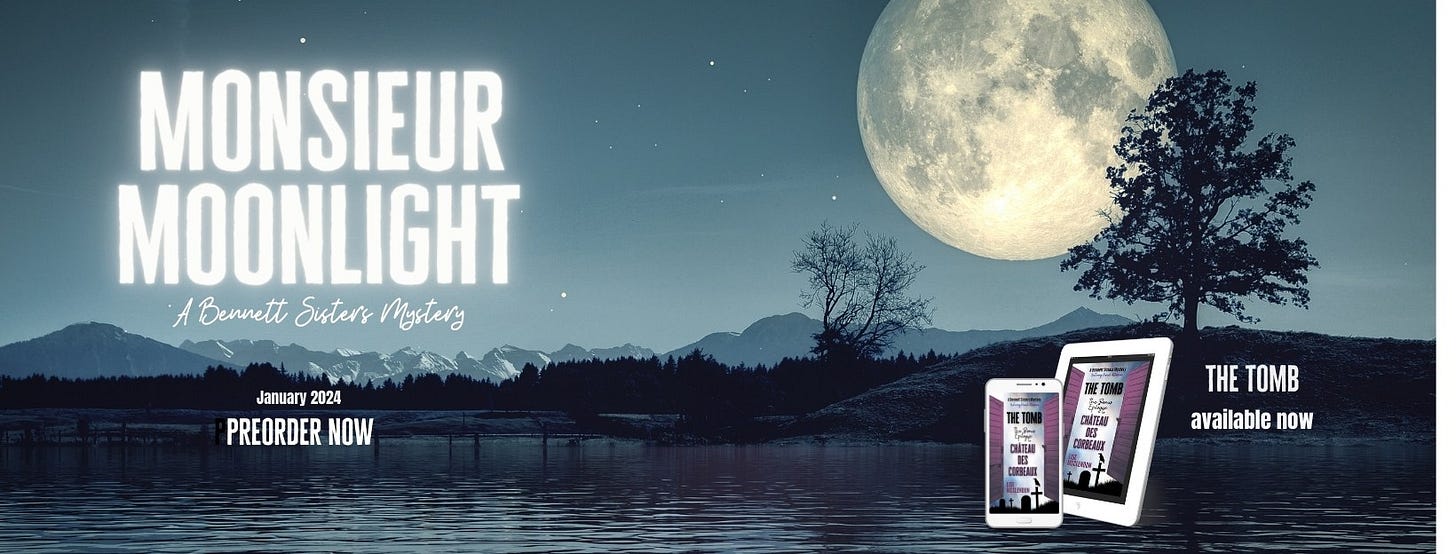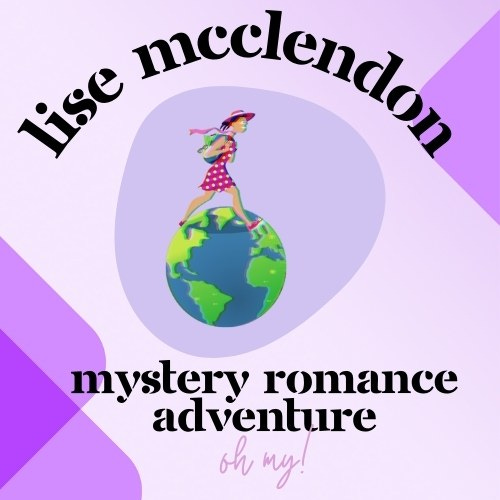The next Bennett Sisters Mystery now has a release date of January 3, 2024. But because you are a subscriber here you are entitled to more, right? An early look at the story, right here, right now (as Annie would say.) No time like the present!
This story follows on the events of Château des Corbeaux, especially the events that take place in the bonus epilogue, The Tomb. As a subscriber you have access to this epilogue for free, here on my website: THE TOMB. The password is TheTomb
Quick note: This preview of ‘Monsieur Moonlight’ is free for all subscribers. To read on in the story, please consider becoming a paid subscriber. Merci.
(Before we dive in, did you vote for your favorite cover? The poll is still available here.)
Monsieur Moonlight
Chapter 1
The third day was the worst. The tiny road house on the outskirts of Sainte-Collette reeked of onions and rancid pork. Rats scrambled through the rafters at night, keeping him awake. How had it come to this? The man sat on the sagging bed with its stained, filthy linens and put his head in his hands. It was now three in the morning but somewhere a rooster crowed.
He felt murderous.
He would be gone when the mistress of the hostellerie rolled out of bed. That was quite early, four-thirty, but he had to leave before her. There was no choice. He could hear her sing-song voice in his head, saying the name he’d given her: “Bonjour, Richard! Avez-vous bien dormi? Bon! Bon!”
He never slept well. He barely slept at all in this hovel. He hated it, and hated her.
He rose, sighing. He couldn’t afford these feelings for a stranger. He was better than that, he told himself. He smacked water on his cheeks and rubbed his eyes. He needed to shave but there was no hot water. Somewhere he must make himself presentable.
Down the creaky stairs, he tiptoed past the kitchen and the mistress’s door, carrying his shoes and his lumpy leather valise. A scene popped into his mind, the shop in Florence where he’d bought the bag, a fine leather establishment. In his salad days, so many years ago. Not really that many, but to his mind, a lifetime ago.
He squeezed out the door and gently closed it behind him. Slipping on his shoes, he took a moment to look at the stars. He’d always liked the night sky, the moon, the constellations, the occasional meteor streaking across on its last fiery gasp. Once he had imagined himself a star. Not of the firmament but something like it, a special person, extraordinary, talented, handsome, rich— everything good, even envious. He felt strangers’ l’approbation, their approval, their jealousy, their admiration.
He stepped down into the dirt lane, smelling eau de bovine nearby. He heard the cows mooing, a mournful sound.
He sighed. How the mighty have fallen.
The trains, both of them, earlier from Paris and the second from Bordeaux, were as usual swift and efficient, landing Pascal and Merle in Sainte-Foy-la-Grande in time for dinner. The sky was already dark at 8 pm in April but in the countryside the air smelled of flowers. The rail station reeked of dull convenience but no one complained. It was in and out, lickety-split.
Merle had dozed on the train, between Paris and Bordeaux, before they changed to the regional line. Pascal sat quietly, staring out the window next to her. He examined how he felt, having relinquished almost all of Oscar Boissieu’s pilfered antiquities, Roman and Gaul and who-knows-what, to a small museum in Paris. The director of the musée was very eager to display the items, once due diligence had been done, tracing their origins as he could. Where had Oscar dug them up? There were no records. In some ways that made it simpler for the museum: no records, no wrong-doing. Was that true? Pascal had his doubts. It seemed naïve.
Even so, driving across the Dordogne River with Merle, he felt lighter, the burden of the items off his shoulders. Had the old man collected them himself? He’d left no clues as to where the short swords, vases, medallions, and coins were dug up. Oscar was certainly one of those looters you read about, shady operators in the black market of ancient objects. But he didn’t do it for money. And, crucially, he was dead. No arresting him now. Pascal blew out a big breath. The items, some fifty of them found in the stone casket buried in the grounds of the château, were safe now.
Parking near their new favorite restaurant, Au fil de l’eau, was easy tonight. It wasn’t yet summer and the pavement was wet with afternoon rain. The building was near the bridge, next to the promenade along the river, just as its name said— “along the water.” Merle was awake now. She jumped from the BMW.
“It’s not as though we starved in Paris but I love this place,” she said, grabbing Pascal’s arm.
He padded his waistline. “I think I put on a few pounds in Paris.”
“What?” She laughed. “We skipped lunch every day.”
“A criminal offense.”
Inside the softly-lit restaurant they were given a table in the glass atrium, facing the river. The lights of the other side reflected across the water, streaks of yellow and red. They settled in, ordered quickly, and sipped their wine.
“You’re back to Bordeaux in the morning then?” Merle asked, giving him a little pout.
“Dommage. But you have the chickens to keep you company.”
“Oh, yes. I pick them up in the morning.” She paused, thoughtful. “I wonder how badly I will be as a chicken wrangler. I actually know nothing about keeping chickens. I may kill them all in one night. It’s a good thing chicks are cheap. Get it? Cheep cheep.”
He smiled. “How many again?”
“Eight. Is that too many? Not enough?”
He shrugged. “How would I know?”
“How many did Ernest and Harris keep? I can’t remember. But if they all start laying as promised, then we get eight eggs every day. Yikes.” The previous owners of Château des Corbeaux had left their chicken coop. It seemed only natural to keep hens again. To Merle anyway. Pascal shrugged again.
“Oh. I ordered chicken. Poulet Vol au Vent.” She widened her eyes in mock horror. “Sorry, chickies.”
“They are just babies, right?”
“Right. Maybe we need a dog to look out for foxes and owls. We have both, you know.”
Pascal sat back in his chair as their food arrived. It was artful on the plate and smelled heavenly. “I’m aware of the wildlife. But please, chérie, no dogs.”
She squeezed his hand. “Just kidding. Maybe next year.” She laughed at the look on his face.
Merle slept late. Pascal kissed her as she lay in bed, drowsy and tired. He said goodbye and drove back to Sainte-Foy to catch the early train to Bordeaux. He didn’t like leaving Merle alone at the château, especially after the autumn shenanigans by the neighbors, but all seemed calm now. He had work to do that he had to do in the office. He jumped aboard the commuter train, set his paper cup of coffee on the tray, and took out the paperwork he’d been ignoring for the last four days.
The sun was weak but high in the sky when Merle finally stepped outside later that morning. She paused, sipping her espresso, listening to the spring birds in the trees. The old olive tree by the front of the house seemed possessed, branches full of song and feathers. In the back the slightly less grand olive tree sat alone, still. She preferred the lively one. The birds would keep her company this week.
Especially baby chickens. She left in her car a half-hour later, following directions to a farm on the other side of the Dordogne where she had reserved her chicks. The huge sign at the gate— “poussins à vendre”— was unmistakable.
The transaction was swift, no-nonsense. No giggling or cooing or choosing between different chicks, they all looked the same, yellow and fluffy. Count heads, there you go, Bob’s your uncle as the Brits say. How the young farmer, a breezy, blond, twenty-something woman who made Wellingtons look chic, knew the difference between male and female chicks was a mystery. Fingers crossed for no roosters. Merle left with a large cardboard box in her trunk, the lid open for air circulation, and headed home.
The week before they went to Paris she’d stocked up her chicken coop with feeders and supplies. She’d cleaned the nesting boxes, and laid fresh straw. All there was to do now was open the cardboard box on its side, encourage the tiny chicks out, and lock the screened door behind her. She watched them for a while, wondering how attached she’d be, how she’d feel if one was killed by a fox, say. Should she name them? Didn’t everyone name their hens? Was that inviting tragedy? She stepped away, not eager for her heart to be broken. She would wait until they grew a bit.
Turning to the vineyard, she examined the new vines planted by Tristan and Pascal last summer. They needed water so she dutifully pulled out the hoses and gave them a drink. When that was done she was exhausted. Inside she made herself a cheese plate and went to bed early.
As she closed her eyes she heard the ping of her phone announcing a text. She raised her head and squinted at the screen. It was from Elise.
“Hey, sis! Last minute plan— I’m coming with Conor to his tournament in a week. He’s the celebrity golfer so not a big deal. The pressure’s off. Just him, a bunch of duffers, and a big paycheck! It’s outside of Toulouse somewhere so near you! Can we stop in? Love to see your château!”
Merle tapped out an enthusiastic ‘yes’ and flopped back against the pillow. She smiled as she closed her eyes.
Company was always welcome, but especially when she was raising chickens on her own.
Chapter 2
Merle walked down the old staircase the next morning, thinking again that it needed a colorful runner instead of ancient scuffed treads and where could she find one, when the knock came. She paused, holding onto the heavy bannister. She was still thinking decorating. Her mind had flashed to her little cottages in Paquiers that desperately needed attention.
She tipped her head to listen. Was that a knock, this early in the morning? She smoothed her garden khakis, straightened her blouse. At least she was dressed. It was not even 8 o’clock.
And she hadn’t even had her coffee yet, she grumbled to herself. How rude. Who was this unwanted visitor? A second knock sounded rat-a-tat just as she opened the heavy wood door, its iron hinges creaking.
Merle softened her expression, aware that she was uncaffeinated and grumpy. Early mornings were not made for visitors, not since she’d moved to France. She barely tolerated family this early. She made herself smile then blinked into the sunshine at the person on her doorstep. It was no one she knew or recognized. No one from the village, she was sure.
The man was Pascal’s height, tall for most Frenchman, nearly six foot. His black hair was streaked with gray at the temples but thick, combed back from his high forehead. He was tanned, with crow’s feet and lines on his forehead like a man of sixty. He wore the remains of an expensive suit in tan tones, trousers and jacket, wrinkled but mostly clean. His blue shirt was unbuttoned at the neck and brought out the blue of his eyes.
“Madame,” he said gently. “Pardon the intrusion at this hour.”
She nodded, wary. What was he selling? “Il est tôt— it’s early.” She glanced at her watch.
“That it is.” His French was natural, native, but had a rusty quality to it as if he didn’t use it much. “Again, apologies,” he said in English. “Would you prefer anglais?”
She nodded, still wary. At least he asked politely.
“Is monsieur here? Monsieur d’Onscon?” He glanced over her shoulder, into the dark hall. “I have come a long way to see him.”
She blinked at the man again. Suddenly she saw it so plainly, his resemblance to Pascal, the black hair, the strong chin, the stubble, his presence — but aged fifteen years. She was seeing the future. This was Future Pascal come to haunt her. She grabbed the edge of the door. “Come back later,” she muttered, hoping he would go away and never come back, or at least not for fifteen years. She pushed the door.
“Wait, please, madame.” His voice was plaintive, pleading. Hard to ignore. That soft kindness, so like her Pascal. He held out a hand, also just like Pascal’s hands. She looked up. “Please, do not send me away. I know Monsieur d’Onscon — Pascal, I know him. In truth, madame — ”
He put a hand to his throat as if struggling to speak. “He is my brother.”







